Everyone judges. Everyone. No exceptions. I judge and you judge, too. Maybe even more than we’d care to admit. It’s so easy to judge and so hard to stop being judgmental. We judge the food we eat, the books we read, shows we watch, places we go to, events we attend… We judge people – people we know well, people we barely know, people we don’t know at all.
That food is yucky.
That book was boring.
That show is a waste of money.
That place is horrible.
That event was terrible.
To judge means to “form an opinion or conclusion about.” Everyone forms an opinion about someone or something.
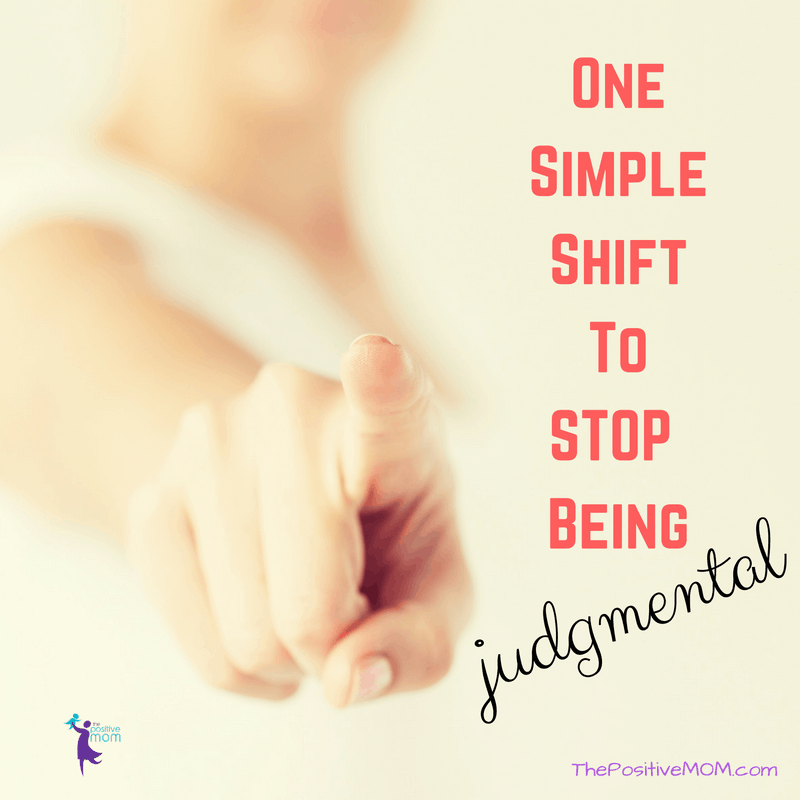
Some synonyms of “judge” are “conclude, decide, consider, think, believe, deem, view, deduce, gather, infer, gauge, estimate, guess, regard as, look on as, take to be, rate as, class as, reckon, and figure.” All things we do … all the time.
Perhaps the yuckiest way of judging is assuming. We assume we know what drives people (their motives, interests, and desires), we assume the worst of their words, their actions, and even their thoughts – as if we could read minds!
She is a bad mom.
She said that to spite me.
She thinks she is better than me.
We criticize without knowing the whole story, and our perception becomes our belief. This is sad because we don’t usually ponder our beliefs, we act upon our beliefs. And if we are willing to drink a dose of humility, we can accept that our beliefs may not be ABSOLUTELY true.
I have a lot of conversations about judgment with friends and coaching or mentoring students and they help me learn why we judge other moms when we can NEVER know for sure what motivates them to believe what they believe, to say what they say, or to do what they do. We are often inclined to think that our opinions and convictions are true and that we alone understand the truth.
Our judgment of others is often inaccurate, because our own story is all that we know. And even when I think of that, I will admit that I don’t even know my own motives sometimes and I’m still on a journey to understand myself!
[Tweet “Our judgment of others is often inaccurate, because our own story is all that we know. #motivationformoms”]
When the topic of judging comes up, I think of a beautiful, brave woman who approached me at a conference I attended with my daughters. She apologized:
“When you walked in with those precious little girls, I scoffed and told my friend: ‘She should have planned better for a sitter so she didn’t have to drag those two little girls to get bored out of their mind at this conference.’ Then I saw how interested and engaged they were and how business-minded they are, and I felt horrible for saying that behind your back.”
My daughters had begged to come with me, and to this day, they are usually excited about attending -and speaking at- conferences, so I was in shock at her words. I had no idea someone could believe something like that about me!
I got emotional about it then (I was 7 months into a difficult pregnancy) but now I think about it and it was a great lesson about judgment for me, because in one simple statement we can cast several harsh judgments and about several people.
A pregnant lady enters a business event with an 8 and a 9-year-old, and people feel the need to evaluate this event, interpret it in a way that makes sense to them, and form an opinion about how they feel about it.
That’s fine. Until, we turn our necessary ability to judge as what philosopher and theologian Jonathan Edwards referred to as “a disposition to think evil of others, or to judge evil in them.“
I don’t think it is possible to stop judging. In fact, I believe having good judgment is necessary to function as a citizen of this life… and as a parent! However, there are always at least two possible ways to judge something or someone.
If she would have thought:
She’s so committed to learn that she attends conferences while heavily pregnant.
How cool that she doesn’t need a sitter because her kids want to go to conferences with her.
She would have been right, but even if she would have been wrong, she would have felt better about herself.
“Do Not Judge,” doesn’t mean to never judge, it means to avoid judgment that leads to suffering and separation. In absence of the “whole story” we could choose to judge favorably, and with empathy, and compassion.
Contrary to general belief, we don’t always judge someone out of jealousy and envy, rivalry, strife, or hatred. It is way more subtle than that.
I once had a friend I loved very much. We spent a lot of time together, planned to be in business together, and thought we’d be friends forever. Until she decided that a particular Facebook status of mine was about her, (it wasn’t!) she took offense to it, and we are no longer friends. It’s been many years. I am still puzzled, and it is still sad.
Assumptions, prejudice, and critical judgment create beliefs that cause suffering and separation. And our conviction causes us to find evidence to validate our views everywhere we go, filling in gaps with imagined reasons and roots of reasons to find fault, minimize favorable qualities, and assign condemnation.
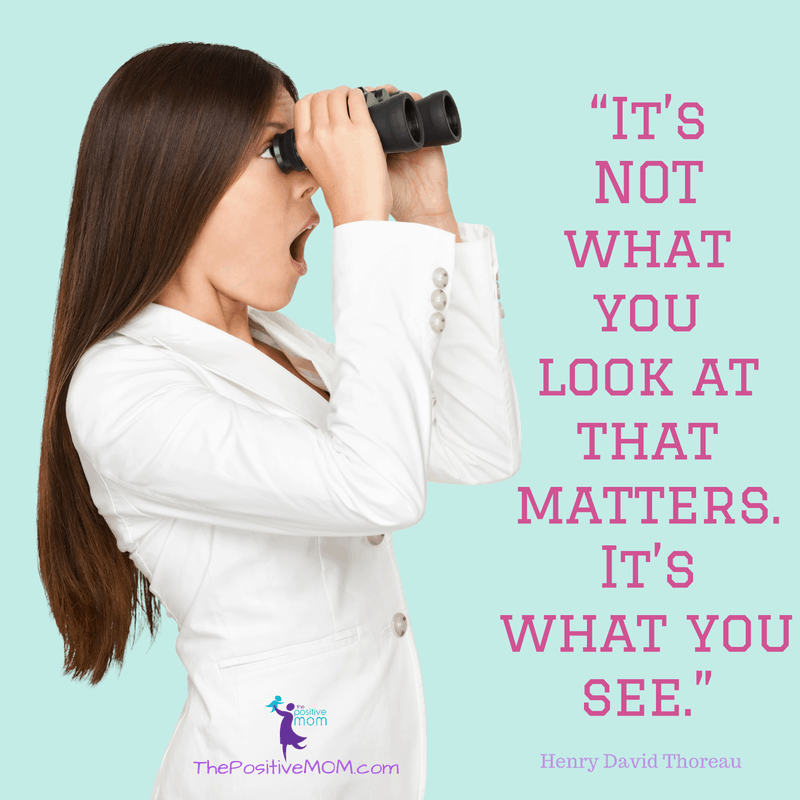
Like Henry David Thoreau said: “It’s not what you look at that matters. It’s what you see.” We look at everything and everyone with the lens of our own life experience, which is, sad to say, often misleading.
And I thought I wasn’t prejudiced. I like to believe I don’t judge someone because of their gender, religion race, lifestyle, or status in life. But that’s not the only way to attach preconceived judgment. When we judge a thing or action as good or bad or as right and wrong, we automatically separate ourselves from the people who support the belief or practice the behavior.
If you have a belief that “good moms breastfeed,” there are no gray areas to allow good moms to formula feed.
Or, if you think that “formula poisons babies,” you automatically assume that moms who formula-feed are murderous… after all, if you really believe this, they would be poisoning their child.
While you may not think or say these exact words, your beliefs will cause separation between you and that mom at the subconscious level because you are attributing the action to an evil motive, rather than finding favorable alternate explanations to her action, or seeking understanding by learning her story.
It’s those absolute opinions we form about how something or someone is where we get in trouble.
That food is yucky.
That book was boring.
That show is a waste of money.
That place is horrible.
That event was terrible.
These blanket statements make everyone who agrees with you right and everyone who disagrees with you wrong, without necessarily being “the truth.”
Take my brother, for instance, who is one of the people I most love in this planet:
He thinks okra is yucky. I think okra is delicious.
I think Harry Potter books are boring. He thinks they are exciting.
He loves Stargate (I think that’s the name of it) and I think it’s a waste of time.
He thinks living in Santo Domingo is not so great. I think it’s superb.
I think motivational conferences are the best thing on earth… He definitely doesn’t think so.
What is THE TRUTH about okra, Harry Potter, Stargate, Santo Domingo, and motivational conferences? It’s the same truth of formula, epidurals, c-sections, binkies and bottles, and disposable diapers: the fact that I didn’t do any of these doesn’t make me the expert authority in issuing a decree that it is the wrong way to do it. Being a mom doesn’t make me a parenting expert who holds the key to all parenting truths.
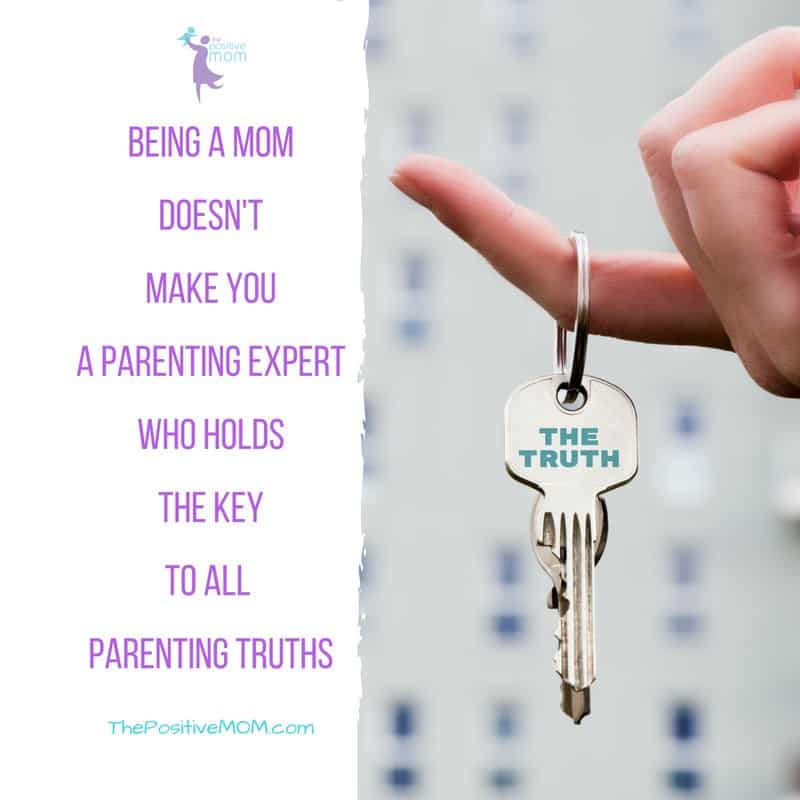
There’s a simple way we can avoid hurting feelings and judging others, and it’s a semantics shift, because our words shape our world:
Okra is yucky.
I don’t like okra.
If like me, you’re on okra’s side, when you read the first statement, you will feel like there’s something wrong with you. The more you love okra, the more shame you will feel, and the more defensive you will get.
Okra is tasty.
I like okra.
It goes both ways. When you state your preferences, rather than stating a universal truth about something or someone, you can leave room for someone else’s preferences to be okay, and even true.
When you shift from making your judgment “the truth,” and take ownership of your belief, your opinion, and your rating, your attitude toward someone who disagrees or behaves differently is not going to be clouded by your perspective.
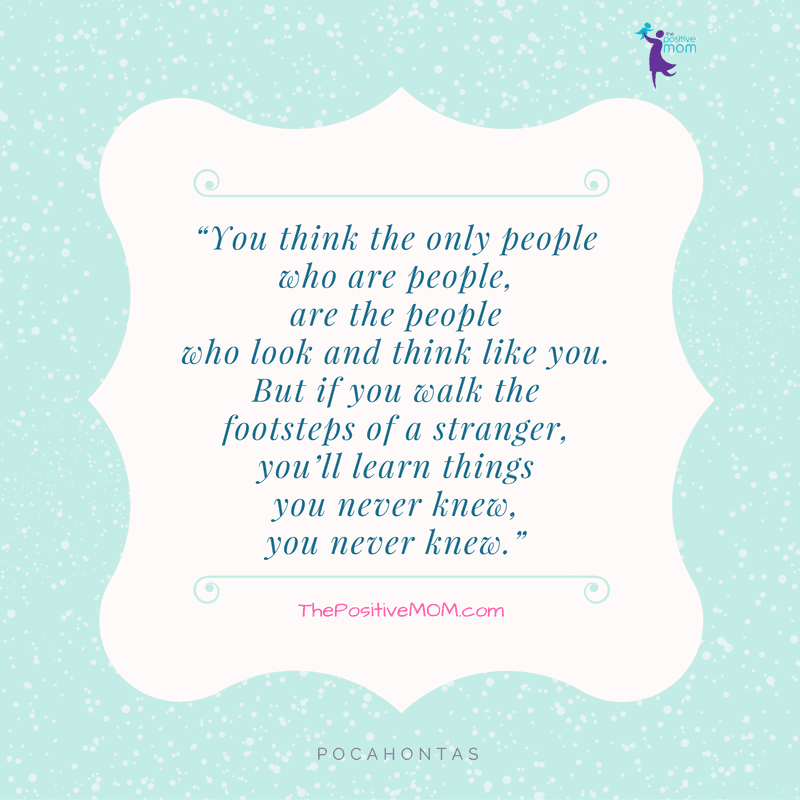
I love the way Pocahontas painted this picture:
“You think the only people who are people, are the people who look and think like you. But if you walk the footsteps of a stranger, you’ll learn things you never knew you never knew.”
My brother totally believes that I like okra. I totally believe he doesn’t. No one needs to defend their point of view… their truth. And maybe you think using the word TRUTH is taking it a bit far, but until I become my brother and experience what it’s like to eat okra “as him,” I can’t really know for sure.
It’s pretentious to say “If I were my brother for a day, I would eat okra and like it.” Yet I can sadly think of numerous times in which I’ve said this with certainty about people in different, more serious situations.
“If I were his mother…” we think when the child has a meltdown in public, but we have no idea what it’s like to mother that child, or to have her life, for that matter, let alone what we would or would not do in her shoes.
I’m striving to learn, to accept, and to understand that while okra is my path, it may not be for everyone. Everyone may experience okra differently. This okra example is cracking me up. LOL
This Dalai Lama teaching explains it well:
“People take different roads seeking fulfillment and happiness. Just because they’re not on your road doesn’t mean they’ve gotten lost.”
And to be blunt, unless it is my underaged child, it is really none of my business what road someone takes. I must focus on staying safe and sane on my own road.
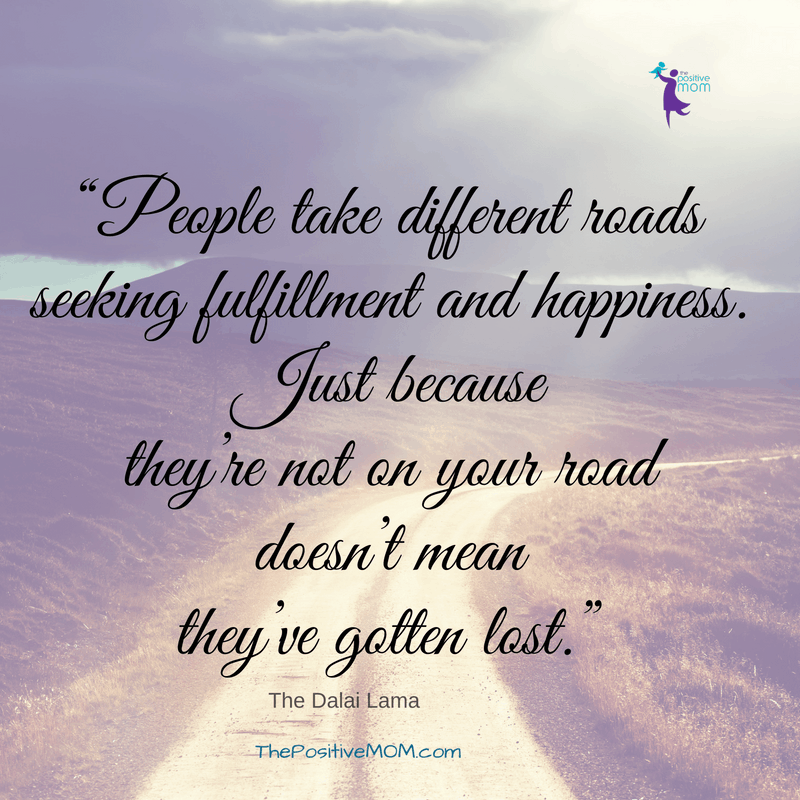
Interactions in which I’ve expected another person, whether a mom or not, to change her road or her lane, usually leaves me annoyed, frustrated, angry, depressed, or holding a grudge. Whenever I focus on being right because “I know” the pertinent facts, I judge her, rather than opening my mind to accept and embrace people where she is.
Let’s pretend I have a friend who complains about her weight, her job, and her marriage, yet she continues to work in the same place, eat the same foods, and put up with the same behaviors from her husband. I get irritated because I give her advice and she doesn’t listen. I’m annoyed because, by now, she should know better. I think of her in a derogatory way, which makes me seem superior; after all, if I were going through that problem, I would certainly act so much differently (in a mature way), and it would go away.
But in this case, I’m not listening to understand, I’m listening to make a pronouncement according to my beliefs. And even if I listened, all beliefs removed, I’m not her and I am unable to fully see her body, her career, and her relationship as she experiences them. I can either see her pain, validate it, and comfort it, or I could access my belief database to rank her choices, habits, and feelings according to standards of our own making and prescribe what she should do to remedy her lack of insight and measure up.
Dr. Wayne Dyer used to say that “judging others does not define who they are; it defines who YOU are.” Judging people who are in pain, rather than helping them, would make our actions cold, self-centered, and merciless. We make it more about what we believe is right or what we believe she should do, rather than about showing compassion for her struggle and helping ease her hurt.
I’m striving to avoid generalized statements that lead to preconceived beliefs that form a plank in my eye. I pray that I can fully see someone else and not judge them. This small shift has made me less judgmental and has helped me catch myself when I do it.
What has helped you stop being judgmental? Share it with us in the comments below – and throw in your thoughts about okra, while you’re at it. LOL
[ela]

Emma Smith
Thursday 22nd of December 2022
I really needed to read this to help stop me being so judgemental, thanks
How To Shoot The Right Picture To Reflect Your Brand
Saturday 19th of December 2020
[…] I’ve learned that it takes only a fraction of a second for someone to see your photo and they may judge it before they read your blog post, books, or watch your […]
My Secret Formula For A Happy Life ~ #FormulaForHappiness ★ Elayna Fernandez ~ The Positive MOM ♥
Friday 27th of March 2020
[…] seems so elusive, especially when you’re a mom. The stress, the worries, the judgment and guilt cycles, the times of despair, and the times our kids break our heart seem to […]
10 Toxic Lies We Need to Stop Telling Our Daughters Now #CaptainMarvel ★ Elayna Fernandez ~ The Positive MOM ♥
Wednesday 12th of June 2019
[…] our emotions, we deny ourselves from learning, growing, and becoming who we are meant to be. Judgment can be deceiving, so it’s exciting that we were given both a brain and a heart and we don’t have to use […]
Karinee
Tuesday 10th of April 2018
We all have been judgmental at some point and to me is about understanding other's people's perspectives of things and situation.